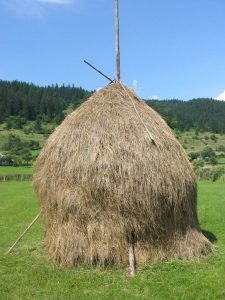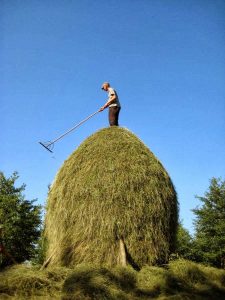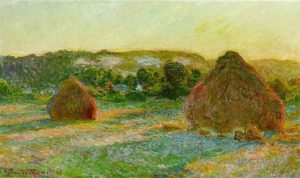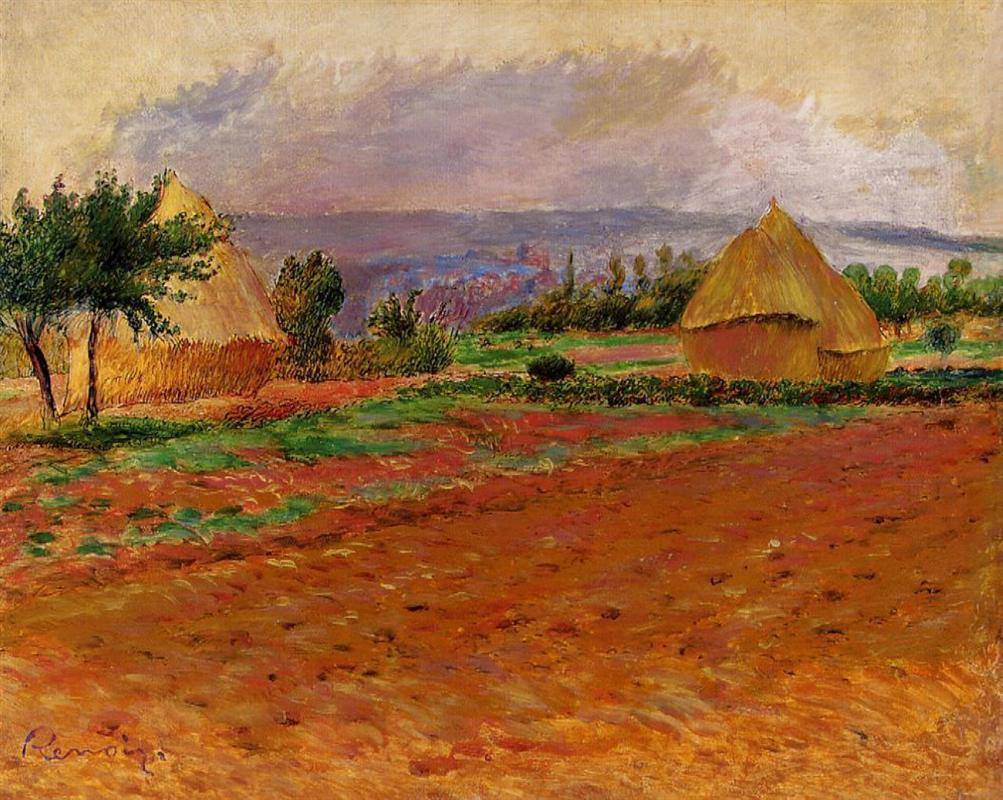Most folks think it’s summer, and they’d be right, but that’s not all it is. It’s also Tractor Season. Those tractors have come out of barns everywhere and rattle up and down the roads in every direction. They roam the hills mowing down grass and then raking it into windrows. Then they gobble it up and spit it out in big round bales. Later, they come back to spear those round bales and carry their prey to large trailers. Finally, the tractors pull the trailers to where the bales will all be stored together until winter. These are the mechanics of turning grass into hay, and I never tire of watching those tractors do their jobs. I am always excited when I see or hear that first tractor bouncing up the road, but that doesn’t stop me from yearning for another time.
 Once upon a time, on a farm in the northwest mountains of North Carolina, turning grass into hay was not just about mechanics. It was an art, and it was the same for every farm around. Instead of the tractor’s hum and the beat of the machinery working, you heard the horses’ snorts and neighs as they pulled the mowing machine or the rake along the steep ground. Instead of a large baler eating up the dried grass just as fast as it can, farmers made simple pitchforks dance with exquisite expertise as they worked up the sweet smelling new hay. Instead of big round bales that weigh hundreds of pounds, you ended up with a beautifully shaped cone of hay wound around a pole that emerged from the center. And finally, instead of leaving an empty field behind as bales are hauled out, rail fences appeared around the stacked hay to keep the cows and horses out until winter.
Once upon a time, on a farm in the northwest mountains of North Carolina, turning grass into hay was not just about mechanics. It was an art, and it was the same for every farm around. Instead of the tractor’s hum and the beat of the machinery working, you heard the horses’ snorts and neighs as they pulled the mowing machine or the rake along the steep ground. Instead of a large baler eating up the dried grass just as fast as it can, farmers made simple pitchforks dance with exquisite expertise as they worked up the sweet smelling new hay. Instead of big round bales that weigh hundreds of pounds, you ended up with a beautifully shaped cone of hay wound around a pole that emerged from the center. And finally, instead of leaving an empty field behind as bales are hauled out, rail fences appeared around the stacked hay to keep the cows and horses out until winter.
This was art, and mountaineer farmers, the descendents of farmers who brought their methods with them to this New World, were the artists. The process remained essentially unchanged all those hundreds of years until the advent of the tractor and modern mechanization slowly replaced it. Sadly, as with so many things from those times, haystacks that once dotted the sides of hills everywhere have disappeared from the landscape. If you close your eyes, though, you can see that it’s all still there.
______________________
The old red truck with the white roof and the large side mirrors rumbled to a stop in the gravel above Maw and Paw’s house. The sun had not awakened quite enough to warm the crisp mountain air from the night before, and Pam and Libby shivered from the rush of cool air through the open windows on the way down the hill. Even though Daddy sported a shirt worn so thin that you could almost see through it, the air did not have the same effect on him.
 He killed the engine, and without bothering to engage the emergency brake, he threw the squeaky door open, and stepped out. He usually strode right across the road and down the stone steps he had dug into the bank as a teenager when Maw and Paw built the house, but today, Daddy held up, waiting for his two daughters to crawl off the bench style seat and out of the truck.
He killed the engine, and without bothering to engage the emergency brake, he threw the squeaky door open, and stepped out. He usually strode right across the road and down the stone steps he had dug into the bank as a teenager when Maw and Paw built the house, but today, Daddy held up, waiting for his two daughters to crawl off the bench style seat and out of the truck.
Nine- year old Libby, still a little too young and excitable to always remember safety precautions, had just started to run across the road when Daddy caught her by the arm. “You know better’n to run out in the road like that!” he scolded a little too harshly as parents often do when their children do something that scares them. Libby looked up at him with those eyes that always melted his heart, and he lightened up. “Girls, you gotta remember to look both ways before you cross the road. Cars come down this hill fast, and what would your mom and me do if one of you got run over?”
He took Libby by the hand, and walked her across the road, admonishing 12 year old Pam along the way, “Now Pam, you’re the oldest. You gotta remember to look out for your sister.” Pam had heard this often when Libby was little, and she did the best she could, but Libby was quicker than a minute and as unpredictable as the weather, so there were times when Pam just couldn’t think of everything that Libby might do.
“I know, Daddy,” was all she said as they reached the other side. Daddy let go of Libby’s hand, and bounded down the stone steps just as he always did when his spirits were high. Pam and Libby ran after him, taking two or three steps for every one of his.
 Daddy’s spirits were high that morning. The hot and dry weather had cured the grass out nicely that he had mown down a few days before. Pete and Kate, the two big workhorses that made life on the farm so much easier, had had until yesterday to rest from pulling the mowing machine with the long sliding blades that lay the grass down. Daddy had harnessed the pair to the rickety old manual rake yesterday and raked the dried grass into windrows. Each time he lowered the rake, he gathered the tines full of grass, then hit the manual lever with his foot that raised them up, releasing the hay. Back down they would drop until he came to the end of the next windrow. He repeated this motion over and over until all the grass had been laid end to end in those long windrows. By the end of the day today, the windrows would all disappear, and Daddy was itching to get started.
Daddy’s spirits were high that morning. The hot and dry weather had cured the grass out nicely that he had mown down a few days before. Pete and Kate, the two big workhorses that made life on the farm so much easier, had had until yesterday to rest from pulling the mowing machine with the long sliding blades that lay the grass down. Daddy had harnessed the pair to the rickety old manual rake yesterday and raked the dried grass into windrows. Each time he lowered the rake, he gathered the tines full of grass, then hit the manual lever with his foot that raised them up, releasing the hay. Back down they would drop until he came to the end of the next windrow. He repeated this motion over and over until all the grass had been laid end to end in those long windrows. By the end of the day today, the windrows would all disappear, and Daddy was itching to get started.
Daddy and the two girls stepped up on the porch at the end of the path. Paw sat there in his chair, hat on, and a twinkle in his eye. He was ready to go. Pam went inside where Maw had just finished “going over the house” before she put on one of Paw’s old long sleeve shirts over her work dress and grabbed her straw hat.
“Maw, why do you always wear a dress? Even in the hayfield?” asked Pam as if this had really just occurred to her for the first time.
“Well,” said Maw with a half grin on her face, “it’s uncomely fer a woman to wear pants. Women should wear dresses.”
“But I got shorts on, Maw,” said Pam, a little confused. “Why don’t I have to wear a dress?”
“Why, you’re still young enough to git by,” Maw explained. “Besides, times is changin’, and the younger women don’t always wear dresses no more. Gracious, by the time you’re grown, you might never have to wear a dress. Now, come on, Breece and Dickie will be in here atter us in a minute.”
And with that, the two joined Paw, Daddy, and Libby out on the porch. Now Pam and Libby’s excitement suddenly exploded as they realized that with three adults in the cab of the truck, they would get to ride in the bed. The cool air that had made them shiver earlier didn’t seem cool at all now, and they could hardly wait to climb up in the back of the truck.
“All right, Snoodlepop,” Daddy said to Pam, “you stand right here against the middle uv the back ov the cab, and Little Snoodlepop, you git in front of Sister Pam and hold on tight to the slats. Pam, let Libby in front uv you and stand up close against her. Put your arms around her and hold onto the slats, too. Don’t let her out frum inside your arms, you understand?”
Pam understood. They didn’t get to ride in the bed of the truck often, but every time they did, Daddy repeated the same instructions, and both girls knew they had better follow those instructions to the letter, or they would never be riding in the back of the truck again.
 Daddy slipped under the wheel, pushed in the clutch, and started the engine. They were off on their three mile trek to Spencer Branch. Daddy drove slowly with the girls in the back, but it was still fast enough that Pam and Libby had to gulp in the crisp air in order to breathe, and the air whipping around them caused huge goosebumps to pop out on their bare arms and legs. Still, riding in the back of the truck was pure exhilaration for both of them!
Daddy slipped under the wheel, pushed in the clutch, and started the engine. They were off on their three mile trek to Spencer Branch. Daddy drove slowly with the girls in the back, but it was still fast enough that Pam and Libby had to gulp in the crisp air in order to breathe, and the air whipping around them caused huge goosebumps to pop out on their bare arms and legs. Still, riding in the back of the truck was pure exhilaration for both of them!
About a mile and a half up the road, they turned off on the Spencer Branch dirt road. From here on, the ride in the back of the truck wasn’t nearly as fun. Instead of drinking in gulps of crisp morning air, they now tried to keep their mouths closed to avoid choking on the dust that the tires threw up. The dust still flew up their nose and stung their eyes, but it was all a small price to pay for the ride in the back of the truck.
A few minutes later, the big old house that Paw had grown up in appeared. No longer the majesty she once was, she still stood to welcome them. Pam always dreaded getting to the other side of the branch where the house was, though. Daddy had to navigate the truck over a shaky old bridge built out of logs and boards that were probably as old as the house. It almost lay in the water, and she always feared that the weight of the vehicle would cause it to break apart and they would fall down into the branch. All she could think of was what it would feel like to drown, and somehow, it never really occurred to Pam that the branch wasn’t more than a foot deep in most places.
Once again, they made it safely across the deathtrap of a bridge. The truck stopped, and went silent. The doors opened. and Daddy, Maw and Paw appeared. Libby and Pam made for the tailgate, and as Daddy lowered it, they jumped off into the grass that always seemed softer up there than it was at home.
Coy, Virgie, and Mary, the family who lived in the old house and helped with the farm work were waiting on the porch. Virgie had a dress on just as Maw did, but not Mary. Mary always wore overalls whether it was comely for women to do so or not. After a few words of pleasantry, all six of the adults along with the two girls went through the crooked gate and headed towards the barn where Pete and Kate stood already harnessed and ready to go. It was time to get started.
__________________
We’ll stop there for today. I hope you will join me next week as we stack all that hay. Until then, close your eyes now and then and sense what’s to come. Smell the sweet smell of new hay mixed with the horses’ sweat. Listen for Maw as she sings those old hymns while she works. Taste the cold spring water spilling from the dipper down your parched throat. Watch as the tromper holds onto the center pole while he tromps the hay down as the stack goes up. Feel the burning ache of your muscles as they lift the pitchforks full of hay. Feel the hot sun beating down on those tired muscles as you eye the shade in the woods just a few yards off. Let your determination rise as you come to grips with how long your workday will be.
Until next week…
———————————–
Monet’s Wheatstacks
https://en.wikipedia.org/wiki/Haystacks_(Monet_series)…
Renoir’s Field and Haystacks
https://www.wikiart.org/…/pierre-a…/field-and-haystacks-1885
Romanian Haystack
https://en.wikipedia.org/wiki/Hay…
Romanian Haystack 2
https://www.google.com/search…

